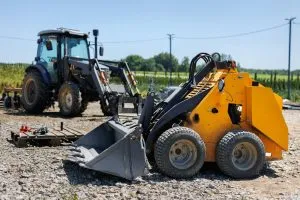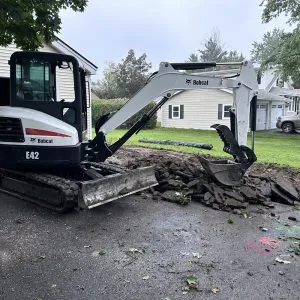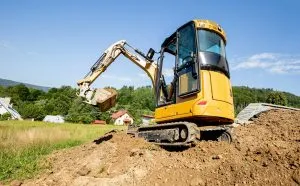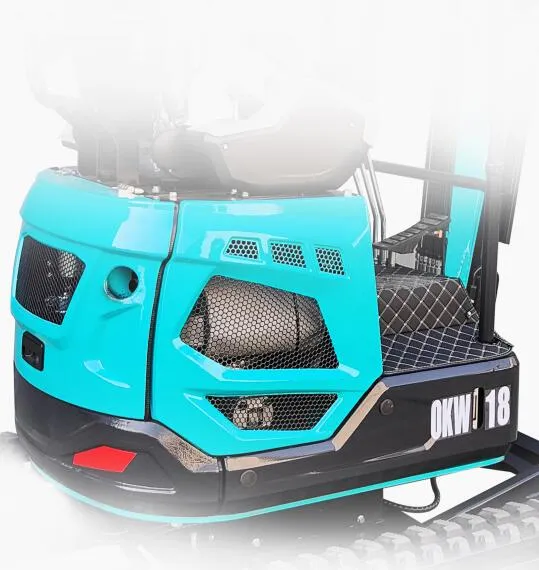When working on construction sites, farms, or large-scale landscaping projects, you will often see powerful machines like tractors and excavators. Both are essential pieces of heavy equipment, but they serve very different purposes. Understanding the difference between a tractor and an excavator is crucial for anyone involved in industries where these machines are used. Let’s dive into the specific differences that set these two machines apart.

Understanding the Basics: What is a Tractor?
A tractor is a versatile machine that is most commonly associated with agriculture. Designed to deliver high torque at low speeds, tractors are primarily used for towing agricultural equipment or machinery like plows, harrows, and trailers. Their strong build and durable tires enable them to work on rough terrains, pulling heavy loads across fields and farms. Modern tractors often come equipped with various attachments, such as mowers, seeders, and loaders, allowing them to perform a wide range of tasks beyond just pulling or towing.

Understanding the Basics: What is an Excavator?
An excavator, on the other hand, is a construction machine primarily used for digging, lifting, and moving large amounts of earth or materials. Characterized by its long arm, called a boom, and a large bucket at the end, the excavator is highly maneuverable and can rotate 360 degrees on its base, known as the house. This design allows it to operate in tight spaces, making it ideal for tasks such as digging trenches, demolishing buildings, and handling heavy materials on construction sites.
Key Functional Differences
The fundamental difference between a tractor and an excavator lies in their functionality. Tractors are mainly designed for tasks related to agriculture and farming. They are built to pull or push heavy machinery and provide the necessary power to operate various farm equipment. Excavators, in contrast, are built for digging and excavation. Their design and structure make them perfect for construction-related tasks, such as excavating foundations, digging trenches, and heavy lifting.
Design and Structure: How Do They Differ?
The design of a tractor is relatively straightforward. It typically has large, rugged tires designed to handle rough terrain, a powerful engine, and a driver’s cabin that provides an elevated view of the surroundings. The tractor’s design focuses on durability and strength, enabling it to pull heavy loads across uneven fields and farm roads.
Excavators, however, have a more complex design. The most distinctive feature of an excavator is its articulated arm, which consists of the boom, stick, and bucket. This arm is mounted on a rotating platform that allows for 360-degree movement. Excavators are usually tracked, meaning they have continuous tracks (similar to tank treads) instead of wheels, which gives them better stability on loose or uneven ground.

Operational Differences: How They Work
Operating a tractor is generally simpler than operating an excavator. Tractors are typically driven like a car, with steering wheels and pedals for acceleration and braking. They are designed for long hours of operation, often across large areas, like fields or farms. The operator must focus on maneuvering the tractor and managing the attached equipment.
Operating an excavator requires more skill and training. The controls in an excavator are more complex, with levers and joysticks used to operate the arm, boom, and bucket. The operator needs to be precise in movements, especially when working in tight spaces or near structures. Excavators also require careful coordination to dig effectively and move materials without causing accidents or damaging the surroundings.
Versatility and Attachments: Expanding Capabilities
Both tractors and excavators are versatile machines, but they differ significantly in their range of attachments and the tasks they can perform.
Tractors can be equipped with a wide variety of attachments, such as plows, harrows, mowers, seeders, and front loaders. This versatility allows them to perform various tasks, from plowing fields and planting crops to mowing grass and clearing snow.
Excavators also have a range of attachments that can be used for different purposes. Apart from the standard digging bucket, they can be fitted with breakers (for demolishing concrete), grapples (for handling materials), augers (for drilling holes), and thumbs (for picking up and placing objects). These attachments make excavators indispensable on construction sites where multiple types of work need to be done.
Speed and Efficiency: Comparing Performance
When it comes to speed, tractors generally have the edge. Tractors are built to cover large areas quickly, making them ideal for tasks like plowing fields or transporting goods across a farm. They can travel relatively fast on roads, which also makes them useful for hauling equipment from one location to another.
Excavators, however, are slower and less suited for long-distance travel. Their primary function is to provide power and precision rather than speed. Excavators are designed to dig and lift with great efficiency, but they move slowly to ensure stability and accuracy, especially when handling heavy loads.
Industries and Applications: Where Are They Used?
Tractors are mainly used in the agricultural industry. They are essential for farming operations, such as plowing, planting, and harvesting. However, tractors are also used in other industries, such as landscaping, where they can be used for tasks like mowing large areas or moving materials.
Excavators are a staple in the construction industry. They are used in building foundations, demolishing structures, and digging trenches for utility installations. Their ability to handle heavy loads and operate in confined spaces makes them crucial in urban construction projects. Excavators are also used in mining, forestry, and large-scale landscaping projects.
Cost and Investment: Which is More Economical?
When considering cost, tractors generally represent a lower investment compared to excavators. The price of a tractor can vary depending on its size, power, and attachments, but they are generally more affordable than excavators. This lower cost makes tractors a popular choice for farmers and small-scale operations.
Excavators, due to their specialized design and capabilities, tend to be more expensive. The cost of an excavator can be quite high, especially for large models with advanced features. However, for construction companies or contractors who need to perform tasks like digging, lifting, and demolishing, the investment in an excavator is often justified by the machine’s versatility and productivity.

Maintenance and Durability: What to Expect?
Both tractors and excavators are built to be durable and withstand heavy use, but they require different levels of maintenance.
Tractors, due to their simpler design and robust build, are relatively easy to maintain. Regular oil changes, tire checks, and engine maintenance are typically sufficient to keep a tractor running smoothly for many years.
Excavators require more complex maintenance due to their hydraulic systems, tracks, and moving parts. Ensuring that the hydraulic system is functioning correctly and that the tracks are properly aligned is crucial for the longevity of an excavator. Regular inspections and servicing are necessary to prevent breakdowns and ensure safe operation.
Conclusion
In summary, while tractors and excavators are both essential pieces of heavy machinery, they serve distinct purposes and are designed with different tasks in mind. Tractors are the workhorses of agriculture, versatile and powerful, ideal for a wide range of farming activities. Excavators are the masters of digging and lifting, indispensable in construction and excavation work. Understanding the differences between these machines can help you choose the right equipment for your specific needs, whether you’re working on a farm or a construction site.






